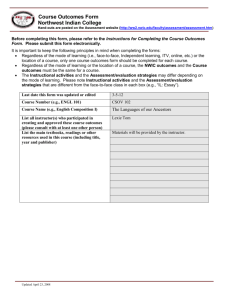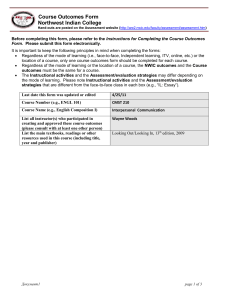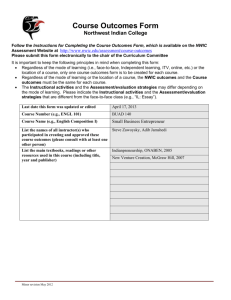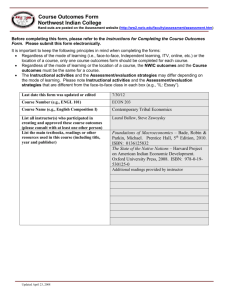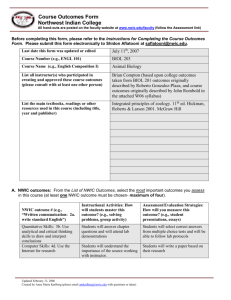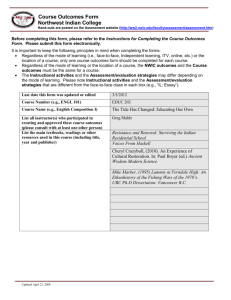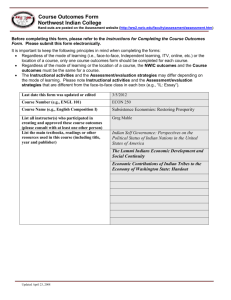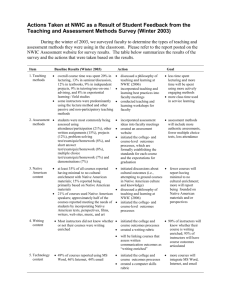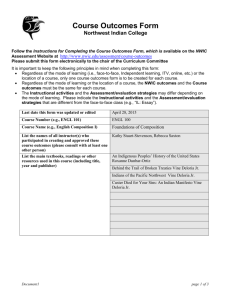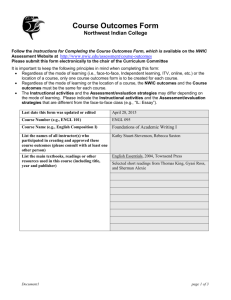Course Outcomes Form - Northwest Indian College
advertisement
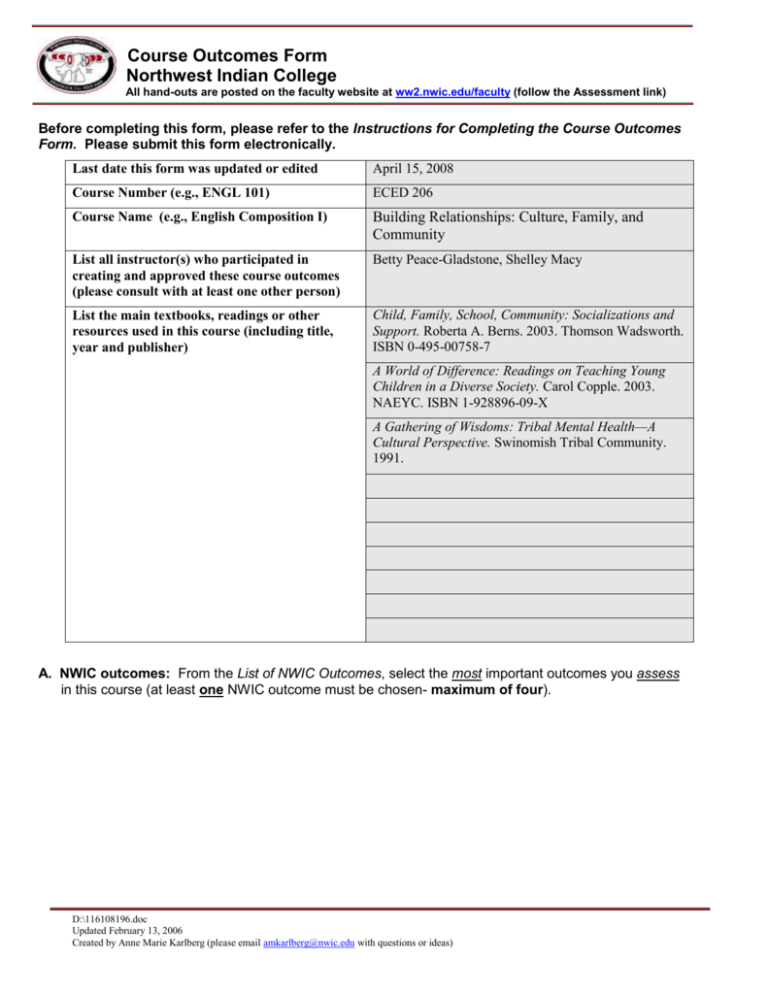
Course Outcomes Form Northwest Indian College All hand-outs are posted on the faculty website at ww2.nwic.edu/faculty (follow the Assessment link) Before completing this form, please refer to the Instructions for Completing the Course Outcomes Form. Please submit this form electronically. Last date this form was updated or edited April 15, 2008 Course Number (e.g., ENGL 101) ECED 206 Course Name (e.g., English Composition I) Building Relationships: Culture, Family, and Community List all instructor(s) who participated in creating and approved these course outcomes (please consult with at least one other person) Betty Peace-Gladstone, Shelley Macy List the main textbooks, readings or other resources used in this course (including title, year and publisher) Child, Family, School, Community: Socializations and Support. Roberta A. Berns. 2003. Thomson Wadsworth. ISBN 0-495-00758-7 A World of Difference: Readings on Teaching Young Children in a Diverse Society. Carol Copple. 2003. NAEYC. ISBN 1-928896-09-X A Gathering of Wisdoms: Tribal Mental Health—A Cultural Perspective. Swinomish Tribal Community. 1991. A. NWIC outcomes: From the List of NWIC Outcomes, select the most important outcomes you assess in this course (at least one NWIC outcome must be chosen- maximum of four). D:\116108196.doc Updated February 13, 2006 Created by Anne Marie Karlberg (please email amkarlberg@nwic.edu with questions or ideas) NWIC outcome # (e.g., “Written communication: 2a. write standard English”) Written Communication: a. Write Standard English Oral Communication: a. Apply effective presentation skills b. Apply interpersonal communication skills Instructional Activities: How will students master this outcome? (e.g., solving problems, group activity) Assessment/Evaluation Strategies: How will you measure this outcome? (e.g., student presentations, essays) Develop resource file, write systems enhancement plan, community resource visit plan, personal eco-map and narrative. Student writing In-class presentation on community resources. Collaborate in designing family systems interview questions. Conduct family systems interview and final paper Participate in in-class discussions. Do weekly “self-assessment” of interpersonal communication skills. Participate in role plays D:\116108196.doc Updated February 13, 2006 Created by Anne Marie Karlberg (please email amkarlberg@nwic.edu with questions or ideas) Presentation Interview questions Formal writing Participation Interpersonal communication log B. Course outcomes: In order of priority, list the most important other learning outcomes for this course that you assess (a maximum of 10). Other course outcomes: Complete the sentence – Instructional Activities: How will students master this outcome? (e.g., solving problems, group activity) Assessment / Evaluation Strategies: How will you measure this outcome? (e.g., student presentations, essays) Compose one (1) written summary or case study of the ways in which biology, culture, socioeconomic status and environmental influences contribute to the shaping of the strengths and needs of the family and of a specific child in the family. Eco-map with written summary. Personal eco-map and written summary. Readings. Reading notes. Identify three (3) main parenting styles and at least two (2) influences that parenting styles have on a child’s development, when examining case studies. Readings, discussions, and role play on parenting styles and influences. Participation in Role play, discussions. As a result of this course, students will be able to… Identify how parenting styles Readings, discussions on family systems and parenting. exist in a classroom, and may or may not be in harmony with a child’s parenting experiences at home. Identify and describe, at least three (3) historical factors that have affected and continue to affect Native Americans. Readings and note-taking on ethics, Role plays on ethical dilemmas and boundaries in working with families. Student class notes and reading notes. In-class participation. Reading notes. Reading notes. Participation and demonstrations of knowledge. Personal eco-map Timeline of Research and identify two or more cultural traditions and values regarding child rearing and family interactions and roles within one’s own community. Readings, Reading notes Interviews, Interview notes. Eco-map development. Personal eco-map. Identify at least three (3) factors that support resilience in children, and a Readings Reading notes. Eco-map development, self, family, community Personal eco-map D:\116108196.doc Updated February 13, 2006 Created by Anne Marie Karlberg (please email amkarlberg@nwic.edu with questions or ideas) strategy that can be used in the home, school and community to support the development of resilience. Based upon a case study, develop an intervention with a resource and referral plan for a child and family that utilizes strengths-based and solutions-oriented practices, needs assessment, eco-map development, and clientcentered practice. Role plays Share strategy either orally or in writing. Develop resource file of resources available for prevention, intervention, family support and enhancement. Completeness of file Develop a plan to enhance local support systems for healthy family and child development in Indian communities. Written plan Community resource visit Visit plan; oral presentation post visit. C. Please list the NWIC outcomes and course outcomes from above on your syllabus. D. Please assess the NWIC outcomes and course outcomes, which are listed above, in your classes. D:\116108196.doc Updated February 13, 2006 Created by Anne Marie Karlberg (please email amkarlberg@nwic.edu with questions or ideas)
